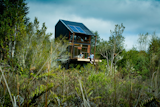Now You Can Build Your Own Off-Grid ZeroCabin and Never Pay Utility Bills Again
Sustainable living just got easier and more accessible. ZeroCabin, a company based in Frutillar, Chile, is offering zero-impact cabin kits that are tailored to your locale. Constructed out of a simple palette of wood and metal, the cozy cabins harvest sunlight and rainwater to operate 100% off the grid.
"ZeroCabin started from the desire to become free. For us, that freedom entails not paying any utility bills," says founder Felipe Lüer. "To get this freedom, you have to use free energy and water—which exist all around the world thanks to the sun and rain. We have to use only these main elements—and nothing else."
To bring his self-sustaining cabins to life, Lüer gathered a team of scientists—a biologist, a chemist and a physicist. Their first off-grid home runs on photovoltaic solar panels, and it features a Becker wood stove for heating, rainwater capture and gray water reuse systems, and earthworm composters.
The cabins can be constructed with minimal impact on the surrounding land, as builders can transport materials by foot and using 4x4s.
The biologist on the ZeroCabin team designed and built a sewage system that uses earthworms to compost waste. "It is the best natural fertilizer that exists," Lüer says.
To maximize solar power, the biologist also embraced the concept of phyllotaxis—how plant leaves arrange themselves in a spiral pattern to optimize photosynthesis. "It gave us the best way to use the sun," Lüer says.
Shop the Look
The ZeroCabin physicist installed a Becker stove that allows the owners to cook and warm water using a third of the amount of wood that it would take normally.
The cabin also incorporates eco-friendly insulation by Rootman. The Chilean company creates a biodegradable and totally natural insulation out of oak roots in a process that uses little fossil fuel.
"The chemist [on the ZeroCabin team] was sure that people would be able to change though epigenetics, being happy would be and internal change into them, our next challenge, was to make a happy and relax living space," Lüer says.
The ZeroCabin DIY kit is available for purchase and shipping worldwide, and each kit is customized based on location. The cabins are carefully designed with topography, rain, and sun metrics in mind. Price is dictated by the size and materials selected by the client.
So far, three ZeroCabins have been built in Chile—one on a puma reserve in Puerto Varas, another on an island near Chiloé, and the final in the city of Panguipulli.
During the construction process, the company looks to do as little damage as possible. With the three current builds, they constructed the cabins near forests and transported materials on trail by foot and using 4x4s.
"ZeroCabin was created with the goal of achieving zero utility bills, zero environmental impact, and happy customers that are better consumers so that we can have a better world," Lüer says. "We do not want sad faces, or to make sustainability a chore."
Published
Last Updated
Get the Dwell Newsletter
Be the first to see our latest home tours, design news, and more.











